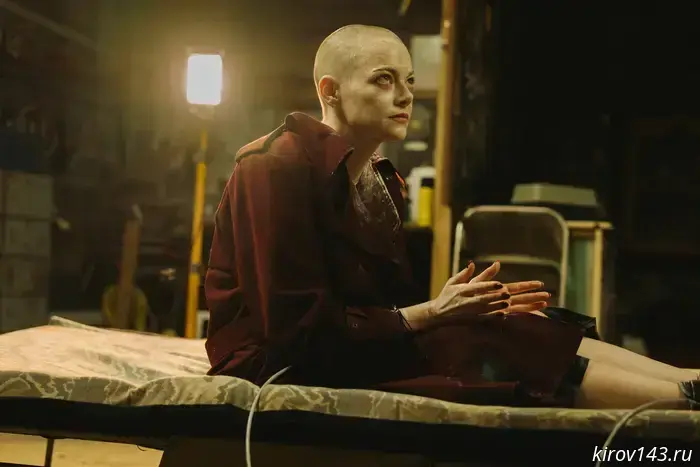
"Bugonia": capitalism from another planet
I usually rarely go to a film without having read at least something about it beforehand. With Bougonia the opposite happened: aside from the director’s name and positive reviews from the Venice Festival I knew nothing. The genre was listed as “comedy,” and the title, which refers to ancient Greek myths, only heightened the intrigue.
It’s one of those cases when expectations were not met at all… and thank God!
What it’s about
In the plot two representatives of the lower middle class — Teddy (Jesse Plemons) and Don (Aidan Delbis) — decide to kidnap the head of one of America’s largest pharmaceutical companies, Michelle (Emma Stone). The young men — horribly sloppy, neurotic, and dissatisfied — are convinced that Michelle is actually an Andromedian who arrived on Earth with the sole purpose of destroying the planet and all living creatures on it.
Bees, aliens and corporate conspiracies
Bougonia is a remake of the South Korean film Save the Green Planet! (2003, 18+). The original can rightly be called a “black comedy”: despite the cruelty of what happens, the tone of the narrative remains ironic. Bougonia, however, is a darker, more serious version. The screenplay was written by Will Tracy, who worked on Succession (18+) and The Menu (18+) — and his touch is noticeable.
Both films (Bougonia and Save the Green Planet!) deal with the problems of the capitalist system, which, in the characters’ view, destroys society like beehives. In both plots the leaders of large corporations are kidnapped — those who are the most important elements of the economic structure. Both Teddy and Lee (the hero of the Korean film) personally suffered from the consequences of corporate decisions: their mothers ended up in comas as a result of incidents related to the activities of those very companies.
The South Korean film looks at the problem in a slightly narrower way — there the main point becomes the moral “decay” of society. Lanthimos, however, widens the context: he shows how the system itself shapes human consciousness and behavior, and how a person seeks to surround themselves only with what confirms their own fears and beliefs. For example, the scene where Teddy drives to work listening to a podcast about aliens intensifies his own paranoia and supports the world he is trying to build in his head.
At the start of the film Teddy and Don completely reject “worldly goods” — the internet, games and even masturbation, resorting to chemical castration. In this way they further enclose themselves within their invented world, afraid that the reality they are trying to escape will reject them.
Some write that Lanthimos is trying to show “toxic masculinity,” unable to create and only able to destroy. That reading is possible, but I wouldn’t want to go down that rabbit hole — yes, one can see a feminist aspect in the film, but in my view it does not come to the fore.
Many know the meaning of the myth that gave the film its name. Bougonia is an ancient rite in which swarms of bees are born from the warm, rotting carcass of a bull. Essentially, this is the key to understanding the film. Lanthimos transfers the myth to the modern day and shows how the new — progressive, merciful, “enlightened” — can be born only through the decomposition of the old and rotten.
Bougonia is one of Lanthimos’s most conceptual and at the same time “genre-pretending” films since The Lobster (18+). It is a work about power, about myths, about the fabrication of moral norms, about the mechanisms of violence and about how human behavior is regulated by rituals just as once it was by agricultural cycles and religious cults.
Then again, who knows — maybe we really do live in a soap bubble of the Andromedian people...
Другие Новости Кирова (НЗК)
 Rahim Azimov: The budget adopted by the State Duma guarantees the fulfillment of all social obligations.
The federal budget for the next three years has been adopted taking into account the key amendments of the United Russia party. This means that all social obligations to citizens will be fulfilled in full.
Rahim Azimov: The budget adopted by the State Duma guarantees the fulfillment of all social obligations.
The federal budget for the next three years has been adopted taking into account the key amendments of the United Russia party. This means that all social obligations to citizens will be fulfilled in full.
 They want to install an information board on Defenders of the Fatherland Street.
The deputies supported the initiative.
They want to install an information board on Defenders of the Fatherland Street.
The deputies supported the initiative.
 Lyubov Peshnina will become the head of the Kirovo-Chepetsky District.
Previously she headed the Fedyakovskoye Rural Settlement.
Lyubov Peshnina will become the head of the Kirovo-Chepetsky District.
Previously she headed the Fedyakovskoye Rural Settlement.
 Simakov promised to take care of the approach to the athletics arena.
The head of the administration commented on a complaint about an unmaintained area.
Simakov promised to take care of the approach to the athletics arena.
The head of the administration commented on a complaint about an unmaintained area.
 The prisoner received a new sentence for displaying Nazi tattoos in the penal colony.
In a correctional colony in the Omutninsky District, an inmate showed other prisoners tattoos depicting prohibited symbols. For a repeated display of Nazi symbols he received an additional sentence.
The prisoner received a new sentence for displaying Nazi tattoos in the penal colony.
In a correctional colony in the Omutninsky District, an inmate showed other prisoners tattoos depicting prohibited symbols. For a repeated display of Nazi symbols he received an additional sentence.
 Magosimyanova has left the Kirov City Duma.
The deputy tendered her resignation.
Magosimyanova has left the Kirov City Duma.
The deputy tendered her resignation.
"Bugonia": capitalism from another planet
Many people in the comments under my previous article about “Frankenstein” noted that at best you could call me a “not-quite-a-reviewer.” And who am I to argue?) So today we’ll have a NEDO-review of “Bugonia” (2025, 18+) by Yorgos Lanthimos.
